
Naoki “Yoshi-P” Yoshida, the influential director of Final Fantasy XIV* and producer of Final Fantasy XVI, recently addressed widespread fan speculation regarding the combat direction of Final Fantasy XVII. Although Yoshida hasn’t helmed every franchise installment, Square Enix still positioned him in a leadership role, seeing him as a key voice in their decision-making process for the series’ future. Given the director’s achievements, what could he possibly say to bring more excitement to the beloved series?
Square Enix Weighs Nostalgia vs. Cinematic Action
Yoshida responded, while deliberately non-committal, by acknowledging the notable success of the turn-based indie RPG Clair Obscur: Expedition 33 and its potential impact on FF17‘s development. Furthermore, Square Enix expressed public awareness of Clair Obscur‘s critical and commercial reception, hinting at a revival of traditional turn-based mechanics for the next mainline Final Fantasy. Additionally, he explicitly stated that the development team was still deciding between a fully turn-based system or continued action-oriented combat for the next game, with the door wide open for either approach.
Moreover, Square Enix’s current evaluation period, where feedback on FF16‘s action-heavy system showcases this ambiguity. In particular, criticisms about its reduced strategic depth compared to classic entries remain under active review. Consequently, a hybrid combat model similar to the FF7 Remake series may be pursued by the company. Specifically, this model blends real-time action with tactical elements, rather than a wholesale return to pure turn-based battles. Ultimately, Square Enix had to choose between prioritizing the nostalgic appeal and strategic complexity championed by Clair Obscur‘s success, or refining the cinematic action approach that defines its recent flagship titles.
Clair Obscur Exposes Square Enix’s Turn-Based Gaslighting

Square Enix has demonstrated success with Clair Obscur: Expedition 33’s turn-based combat mechanics. As a result, the company possesses compelling reasons to reevaluate the foundational systems that originally established the Final Fantasy franchise’s prominence. For some gamers, turn-based systems may be seen as outdated. However, the game effectively showcases their enduring potential for innovation when approached creatively.
Consequently, the next mainline entry follows a strategically sound direction, exploring novel avenues within a turn-based framework. Due to this approach, the series’ historical commitment has a chance to reinvent gameplay paradigms. With Square Enix’s proven expertise in evolving classic formulas, a return to turn-based roots—infused with fresh mechanics—could actually represent the boldest innovation for Final Fantasy XVII rather than a retreat to tradition.
Final Fantasy XVII: Turn-Based or Action Crossroads
Due to this decision over the gameplay mechanic, Square Enix carries significant weight on their shoulders. Given their potential choices, the series will either re-embrace deeper strategic engagement or continue prioritizing cinematic action. Interestingly, this choice highlights criticism regarding the latter’s reduced tactical depth in recent titles remains unresolved. While all current challenges facing the franchise—including broader branding issues—aren’t solely caused by combat systems alone, its trajectory will undoubtedly be shaped by this design choice.
Furthermore, observers hopeful for a sophisticated turn-based or hybrid system have acknowledged that regardless of what choice is made, it doesn’t automatically guarantee greatness. However, Yoshida expressed openness to reevaluating both turn-based and action-based approaches offers legitimate grounds for optimism. Under Yoshi-P’s flexible leadership, Square Enix’s willingness to reconsider established norms provides reassurance that the chosen path lies between a turn-based renaissance or a refined action system, reflecting genuine creative conviction rather than reactionary trend-chasing.
More must-reads:
- Eagles legend praises Nick Sirianni for bold Super Bowl banner-raising decision
- Bengals HC Zac Taylor 'challenged' Joe Burrow and the offense
- The 'NFL 2025 Week 1 starting QBs' quiz
Breaking News
Trending News
Customize Your Newsletter
 +
+
Get the latest news and rumors, customized to your favorite sports and teams. Emailed daily. Always free!








